人教版(2019)选择性必修 第二册Unit 1 Science and Scientists Discover Useful Structures表语从句课件(共20张PPT)
文档属性
| 名称 | 人教版(2019)选择性必修 第二册Unit 1 Science and Scientists Discover Useful Structures表语从句课件(共20张PPT) | 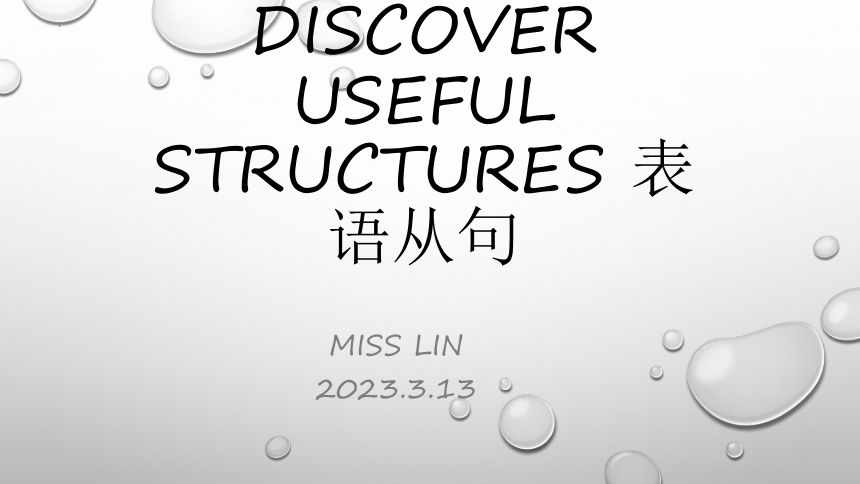 | |
| 格式 | pptx | ||
| 文件大小 | 1.5MB | ||
| 资源类型 | 教案 | ||
| 版本资源 | 人教版(2019) | ||
| 科目 | 英语 | ||
| 更新时间 | 2023-03-13 12:56:15 | ||
图片预览

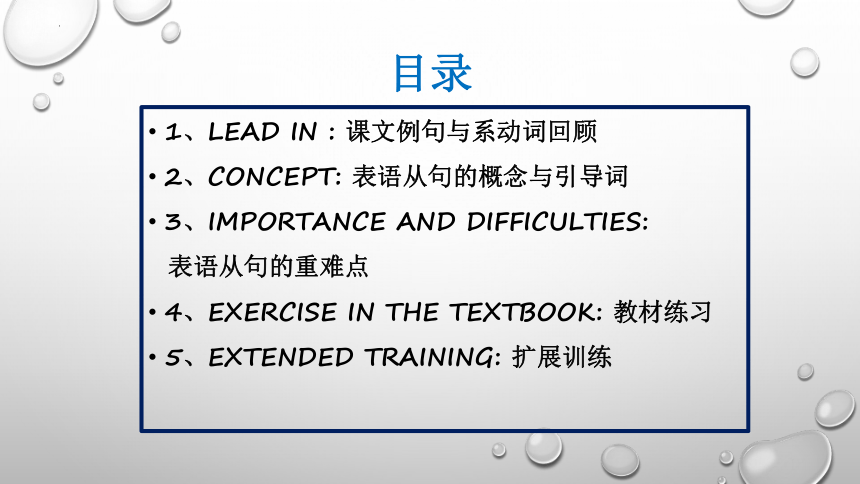
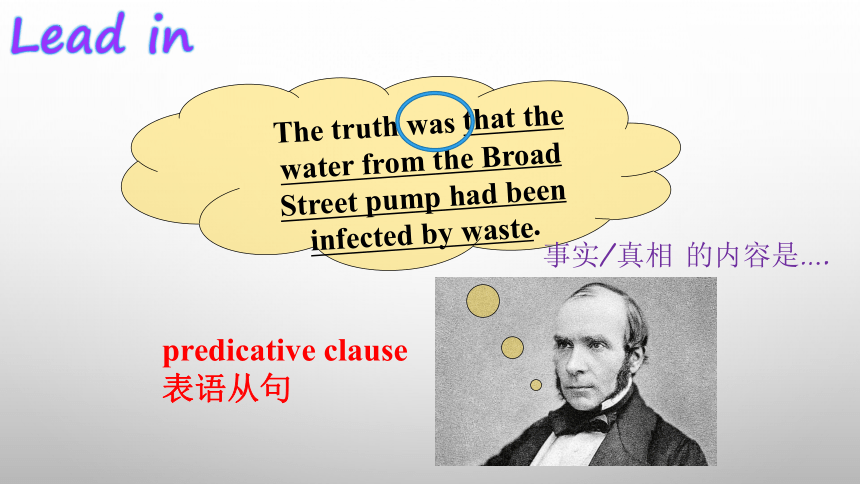
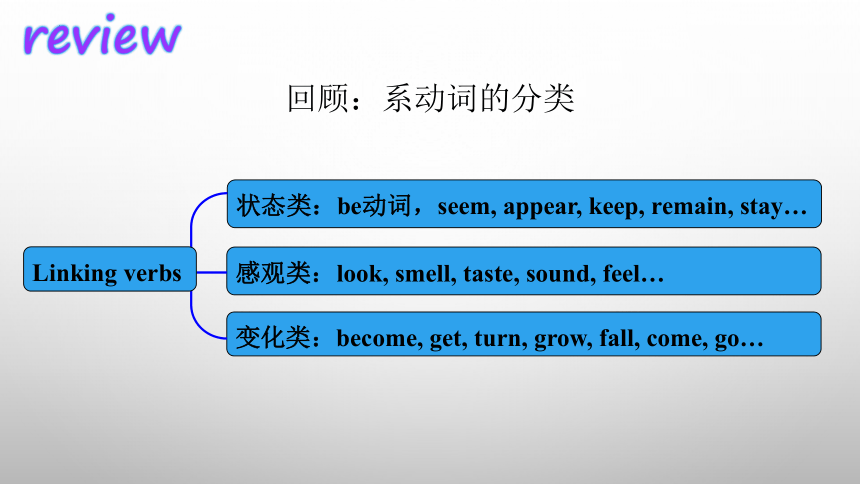
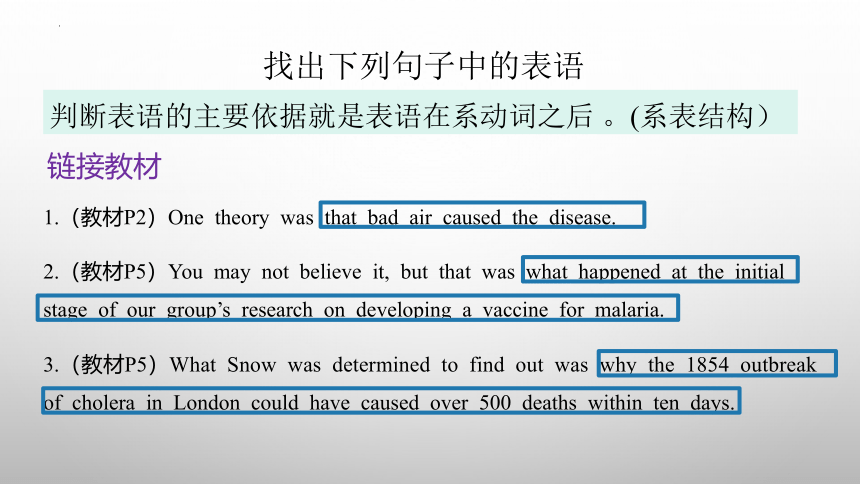
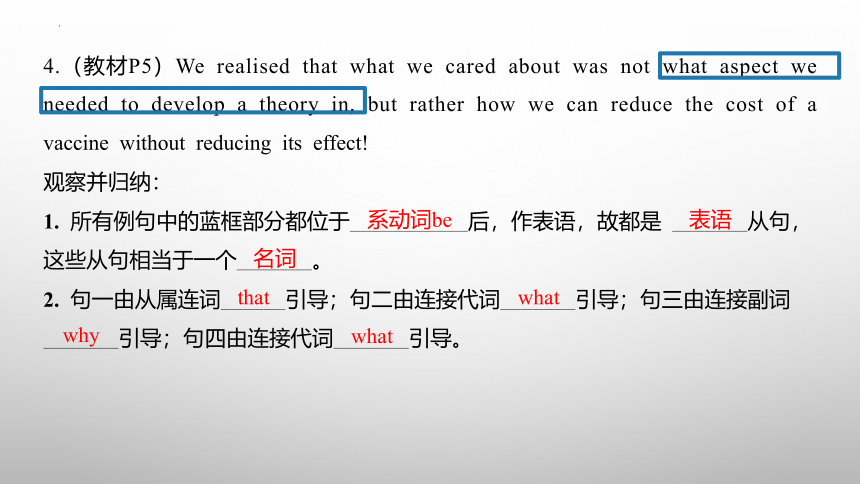
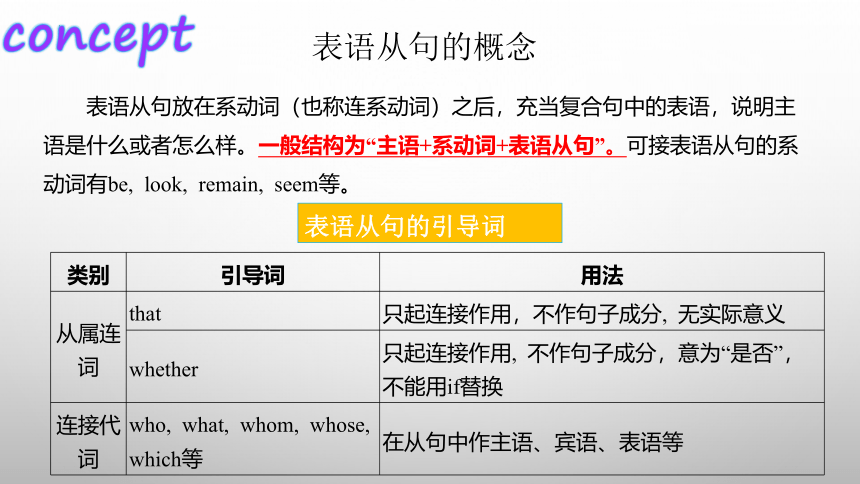
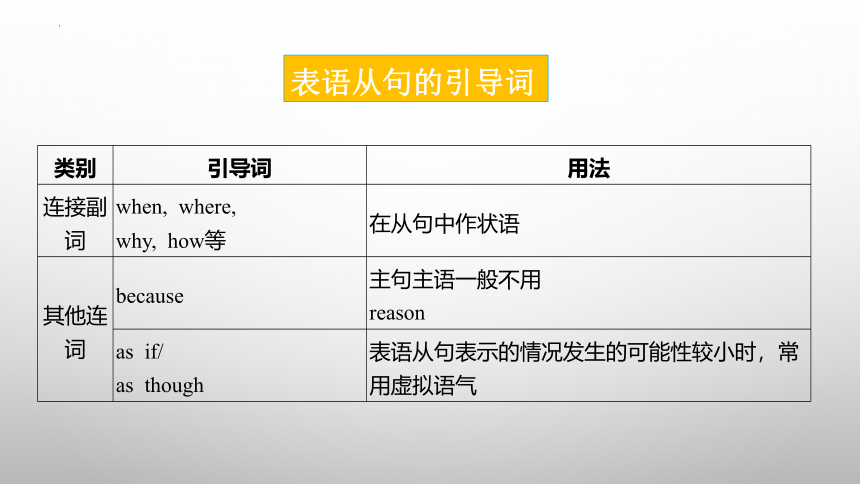
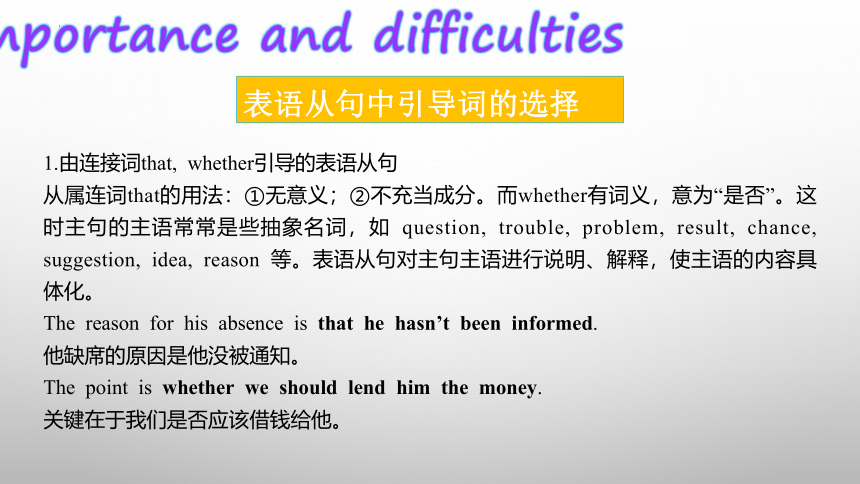
文档简介
(共20张PPT)
unit 1 discover useful structures 表语从句
miss lin
2023.3.13
目录
1、lead in : 课文例句与系动词回顾
2、concept: 表语从句的概念与引导词
3、importance and difficulties:
表语从句的重难点
4、exercise in the textbook: 教材练习
5、extended training: 扩展训练
The truth was that the water from the Broad Street pump had been infected by waste.
Lead in
predicative clause
表语从句
事实/真相 的内容是….
回顾:系动词的分类
状态类:be动词,seem, appear, keep, remain, stay…
感观类:look, smell, taste, sound, feel…
变化类:become, get, turn, grow, fall, come, go…
Linking verbs
review
找出下列句子中的表语
判断表语的主要依据就是表语在系动词之后 。(系表结构)
链接教材
1.(教材P2)One theory was that bad air caused the disease.
2.(教材P5)You may not believe it, but that was what happened at the initial stage of our group’s research on developing a vaccine for malaria.
3.(教材P5)What Snow was determined to find out was why the 1854 outbreak of cholera in London could have caused over 500 deaths within ten days.
4.(教材P5)We realised that what we cared about was not what aspect we needed to develop a theory in, but rather how we can reduce the cost of a vaccine without reducing its effect!
观察并归纳:
1. 所有例句中的蓝框部分都位于___________后,作表语,故都是 _______从句,这些从句相当于一个_______。
系动词be
表语
名词
2. 句一由从属连词______引导;句二由连接代词_______引导;句三由连接副词 _______引导;句四由连接代词_______引导。
that
what
why
what
表语从句的概念
表语从句放在系动词(也称连系动词)之后,充当复合句中的表语,说明主语是什么或者怎么样。一般结构为“主语+系动词+表语从句”。可接表语从句的系动词有be, look, remain, seem等。
concept
类别 引导词 用法
从属连词 that 只起连接作用,不作句子成分, 无实际意义
whether 只起连接作用, 不作句子成分,意为“是否”,不能用if替换
连接代词 who, what, whom, whose, which等 在从句中作主语、宾语、表语等
表语从句的引导词
类别 引导词 用法
连接副词 when, where, why, how等 在从句中作状语
其他连词 because 主句主语一般不用
reason
as if/ as though 表语从句表示的情况发生的可能性较小时,常用虚拟语气
表语从句的引导词
Importance and difficulties
表语从句中引导词的选择
1.由连接词that, whether引导的表语从句
从属连词that的用法:①无意义;②不充当成分。而whether有词义,意为“是否”。这时主句的主语常常是些抽象名词,如 question, trouble, problem, result, chance, suggestion, idea, reason 等。表语从句对主句主语进行说明、解释,使主语的内容具体化。
The reason for his absence is that he hasn’t been informed.
他缺席的原因是他没被通知。
The point is whether we should lend him the money.
关键在于我们是否应该借钱给他。
2.由连接代词引导的表语从句
在连接代词who, what, which, whom, whose等引导的表语从句中,连接代词在句中作主语、宾语、表语等,并且不能省略。
The question is which of us should go.
问题是我们哪一个应该去。
The problem was who could do the work.
问题是谁能做这项工作。
That’s what he is worrying about.
那就是他在担心的事。
表语从句中引导词的选择
3.由连接副词引导的表语从句
在连接副词 when, where, why, how 等引导的表语从句中,连接副词在从句中作状语。
Go and get your coat. It’s where you left it.
去把你的衣服拿来。就在你原来放的地方。
I had neither a raincoat nor an umbrella. That’s why I got wet through.
我既没雨衣也没伞。那就是我湿透的原因。
That is how mice ruin large scores of grain every year.
那就是老鼠每年是怎样损害大量粮食的。
表语从句中引导词的选择
4.由连词because, as if/as though等引导的表语从句
It looked as if it was going to snow.
看起来好像要下雪了。
That’s because we never thought of it.
那是因为我们从未想过此事。
It seems as though he didn’t know the answer.
看起来他好像不知道答案。
表语从句中引导词的选择
Exercise in the textbook
Answer the following questions using the information from the reading passage as well as the predicative clauses.
What was it that John Snow showed to the world
→What John Snow showed to the world was how cholera could be overcome.
1. What was Snow's discovery in two particular streets in London
Snow's discovery in two particular streets in London was that ____________________________________________________
____________________________________________________.
2. What was Snow determined to find out during the 1854 outbreak of cholera in London
What Snow was determined to find out was why ________________________________________________________________________________________________________.
the cholera outbreak was so severe that more than 500 people died in ten days
the outbreak of cholera had caused over 500 deaths within ten days
3. What were the exact places Snow marked on the map
The exact places Snow marked on the map were where ___________________________________________________.
4. What was the finding that Snow announced
Snow's finding was that ______________________________
___________________________________________________
___________________________________________________
___________________________________________________.
all those who died had lived / all the dead people had lived
the water pump was to blame for the spread of cholera/ the pump water carried cholera germs/ water from the Broad Street pump had been infected by waste
David is talking to Maria about their scientific research project. First complete David’s lines (A-E), using the words in the box. Then put David’s lines in the correct order and practise the conversation.
as if, that, what, who, when,
how, why, whose, which, whether
A. Absolutely. You may not believe it, but that was ________ happened at the initial stage of our group's research on developing a vaccine for malaria.
what
B. Yes, it is. And it seemed _______ all the theories were useful, but the fact was _____ we couldn't persuade one another that one theory was better than another.
C. Exactly. The problem was not about ________ all our theories were equally good, but in deciding _______________ theory to depend upon.
as if
that
as if, that, what, who, when,
how, why, whose, which, whether
which/ what/ whose
whether
D. We realised that what we cared about was not ___________ aspect we needed to develop a theory in, but rather ______ we can reduce the cost of a vaccine without reducing its effect!
E. You're right. At last, we became focused on the key issue, which was ______ we had to carry out the research in the first place.
which/ what
how
as if, that, what, who, when,
how, why, whose, which, whether
why
Extended training
单句语法填空
1. He went to the hospital for a medical examination. And that is _______ he was absent from the meeting.
why
2. The reason why she preferred city life is ______ she can have easy access to places like shops and restaurants.
that
3. All the mistakes I ever made in my life were _______ I wanted to say “No” and said “Yes”.
when
4. As John Lennon once said, life is _______ happens to you while you are busy making other plans.
what
7. The reason why I was sad was ______ he didn’t understand me.
that
8. The problem is _______ is really fit for the hard job.
who
9. That’s________I first met her, the small beautiful park.
where
10. The first time we met each other was _______ we studied in that school.
when
unit 1 discover useful structures 表语从句
miss lin
2023.3.13
目录
1、lead in : 课文例句与系动词回顾
2、concept: 表语从句的概念与引导词
3、importance and difficulties:
表语从句的重难点
4、exercise in the textbook: 教材练习
5、extended training: 扩展训练
The truth was that the water from the Broad Street pump had been infected by waste.
Lead in
predicative clause
表语从句
事实/真相 的内容是….
回顾:系动词的分类
状态类:be动词,seem, appear, keep, remain, stay…
感观类:look, smell, taste, sound, feel…
变化类:become, get, turn, grow, fall, come, go…
Linking verbs
review
找出下列句子中的表语
判断表语的主要依据就是表语在系动词之后 。(系表结构)
链接教材
1.(教材P2)One theory was that bad air caused the disease.
2.(教材P5)You may not believe it, but that was what happened at the initial stage of our group’s research on developing a vaccine for malaria.
3.(教材P5)What Snow was determined to find out was why the 1854 outbreak of cholera in London could have caused over 500 deaths within ten days.
4.(教材P5)We realised that what we cared about was not what aspect we needed to develop a theory in, but rather how we can reduce the cost of a vaccine without reducing its effect!
观察并归纳:
1. 所有例句中的蓝框部分都位于___________后,作表语,故都是 _______从句,这些从句相当于一个_______。
系动词be
表语
名词
2. 句一由从属连词______引导;句二由连接代词_______引导;句三由连接副词 _______引导;句四由连接代词_______引导。
that
what
why
what
表语从句的概念
表语从句放在系动词(也称连系动词)之后,充当复合句中的表语,说明主语是什么或者怎么样。一般结构为“主语+系动词+表语从句”。可接表语从句的系动词有be, look, remain, seem等。
concept
类别 引导词 用法
从属连词 that 只起连接作用,不作句子成分, 无实际意义
whether 只起连接作用, 不作句子成分,意为“是否”,不能用if替换
连接代词 who, what, whom, whose, which等 在从句中作主语、宾语、表语等
表语从句的引导词
类别 引导词 用法
连接副词 when, where, why, how等 在从句中作状语
其他连词 because 主句主语一般不用
reason
as if/ as though 表语从句表示的情况发生的可能性较小时,常用虚拟语气
表语从句的引导词
Importance and difficulties
表语从句中引导词的选择
1.由连接词that, whether引导的表语从句
从属连词that的用法:①无意义;②不充当成分。而whether有词义,意为“是否”。这时主句的主语常常是些抽象名词,如 question, trouble, problem, result, chance, suggestion, idea, reason 等。表语从句对主句主语进行说明、解释,使主语的内容具体化。
The reason for his absence is that he hasn’t been informed.
他缺席的原因是他没被通知。
The point is whether we should lend him the money.
关键在于我们是否应该借钱给他。
2.由连接代词引导的表语从句
在连接代词who, what, which, whom, whose等引导的表语从句中,连接代词在句中作主语、宾语、表语等,并且不能省略。
The question is which of us should go.
问题是我们哪一个应该去。
The problem was who could do the work.
问题是谁能做这项工作。
That’s what he is worrying about.
那就是他在担心的事。
表语从句中引导词的选择
3.由连接副词引导的表语从句
在连接副词 when, where, why, how 等引导的表语从句中,连接副词在从句中作状语。
Go and get your coat. It’s where you left it.
去把你的衣服拿来。就在你原来放的地方。
I had neither a raincoat nor an umbrella. That’s why I got wet through.
我既没雨衣也没伞。那就是我湿透的原因。
That is how mice ruin large scores of grain every year.
那就是老鼠每年是怎样损害大量粮食的。
表语从句中引导词的选择
4.由连词because, as if/as though等引导的表语从句
It looked as if it was going to snow.
看起来好像要下雪了。
That’s because we never thought of it.
那是因为我们从未想过此事。
It seems as though he didn’t know the answer.
看起来他好像不知道答案。
表语从句中引导词的选择
Exercise in the textbook
Answer the following questions using the information from the reading passage as well as the predicative clauses.
What was it that John Snow showed to the world
→What John Snow showed to the world was how cholera could be overcome.
1. What was Snow's discovery in two particular streets in London
Snow's discovery in two particular streets in London was that ____________________________________________________
____________________________________________________.
2. What was Snow determined to find out during the 1854 outbreak of cholera in London
What Snow was determined to find out was why ________________________________________________________________________________________________________.
the cholera outbreak was so severe that more than 500 people died in ten days
the outbreak of cholera had caused over 500 deaths within ten days
3. What were the exact places Snow marked on the map
The exact places Snow marked on the map were where ___________________________________________________.
4. What was the finding that Snow announced
Snow's finding was that ______________________________
___________________________________________________
___________________________________________________
___________________________________________________.
all those who died had lived / all the dead people had lived
the water pump was to blame for the spread of cholera/ the pump water carried cholera germs/ water from the Broad Street pump had been infected by waste
David is talking to Maria about their scientific research project. First complete David’s lines (A-E), using the words in the box. Then put David’s lines in the correct order and practise the conversation.
as if, that, what, who, when,
how, why, whose, which, whether
A. Absolutely. You may not believe it, but that was ________ happened at the initial stage of our group's research on developing a vaccine for malaria.
what
B. Yes, it is. And it seemed _______ all the theories were useful, but the fact was _____ we couldn't persuade one another that one theory was better than another.
C. Exactly. The problem was not about ________ all our theories were equally good, but in deciding _______________ theory to depend upon.
as if
that
as if, that, what, who, when,
how, why, whose, which, whether
which/ what/ whose
whether
D. We realised that what we cared about was not ___________ aspect we needed to develop a theory in, but rather ______ we can reduce the cost of a vaccine without reducing its effect!
E. You're right. At last, we became focused on the key issue, which was ______ we had to carry out the research in the first place.
which/ what
how
as if, that, what, who, when,
how, why, whose, which, whether
why
Extended training
单句语法填空
1. He went to the hospital for a medical examination. And that is _______ he was absent from the meeting.
why
2. The reason why she preferred city life is ______ she can have easy access to places like shops and restaurants.
that
3. All the mistakes I ever made in my life were _______ I wanted to say “No” and said “Yes”.
when
4. As John Lennon once said, life is _______ happens to you while you are busy making other plans.
what
7. The reason why I was sad was ______ he didn’t understand me.
that
8. The problem is _______ is really fit for the hard job.
who
9. That’s________I first met her, the small beautiful park.
where
10. The first time we met each other was _______ we studied in that school.
when
